Beth K. Vogt's Blog, page 15
March 5, 2019
Do You Operate in Crisis Mode?
by @bethvogt
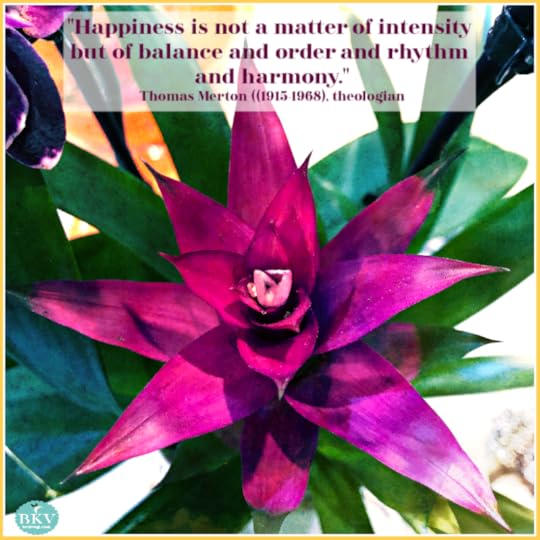
“This is a deadline, not a crisis.”
I woke up in the middle of the night with that phrase running through my head.
I’d gone to bed a couple of hours earlier frustrated yet again. Staring down a looming writing deadline and an insufficient word count.
I’d been chasing that deadline for days – weeks, really – and always coming up short. EVERY. SINGLE. DAY.
I ended each day anxious. Calling myself a failure because I wasn’t accomplishing the goals I set for myself.
Then I heard those words: “This is a deadline, not a crisis.”
And I could breathe again.
I knew God, who promises me rest and hope, had whispered those words to my weary heart.
A deadline is manageable.
A crisis? That’s overwhelming.
It’s so easy for me to go into crisis-mode – and to stay there.
When we’ve lived in a state of constant crisis (for whatever reason), we tend to get stuck there. We don’t even realize it.
I remember years ago sharing with my friend Wise Guy how I evaluated problems that came my way. Here was my method: I would ask one question, “Is this a crisis?”
Easy yes or no, right?
Wise Guy settled back in his chair. Looked at me and said, “You know, there’s a lot of things in between a crisis or not a crisis, right?”
I had to pause and think on that for a while. I hadn’t even realized my evaluation system was faulty. Crisis or not – and nothing else in between? That’s an inflexible and exhausting way to evaluate situations, wouldn’t you agree?
Until God’s whisper two nights ago, I hadn’t realized I’d fallen back into crisis-mode thinking again. I’d backed myself into a corner emotionally, where there was no way of escape.
Once I put my situation back into perspective – I was on deadline. Just on deadline – I could handle things with calmness and clarity. I’m an author. I work with deadlines all the time. I also hadn’t missed my deadline. No, I just wanted to be farther ahead with my deadline.
My screaming, “MAY DAY! MAY DAY!” inside my head was unnecessary. It was akin to throwing a fire alarm because I’d seen a pack of matches and a box of birthday candles lying next to each other in the junk drawer in my kitchen. Pure supposition on my part.
Reality is, I’ve had a few crises in recent months that have tipped me out of balance. It’s time to stop. To find center again and allow my emotions to regain equilibrium. Just because I’ve dealt with some emergencies doesn’t mean I should live in a constant state of crisis. Life is so much more than crisis or not.
Do You Operate in Crisis Mode? http://bit.ly/2H0E31L #balance #emotions
Click To Tweet
'Happiness is not a matter of intensity but of balance and order and rhythm and harmony.' #quote by Thomas Merton #emotionalhealth
Click To Tweet
February 26, 2019
Identifying Unclaimed Emotional Baggage
by @bethvogt
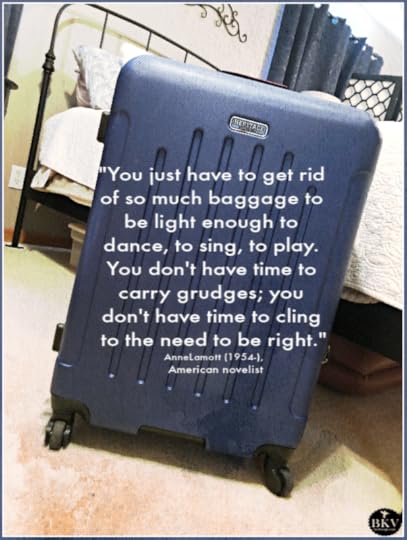
Last weekend one of my closest friends texted me this question: When does all the baggage stop bubbling to the surface?
Her question is a bit of a mixed metaphor, yes, but still it brought to mind a vivid image: a murky lake filled with suitcases bobbing to the the surface.
Works for me.
In her next text, my friend answered her own question: Oh, yeah! When I deal with it.
I mulled over her personal Q&A for the rest of the day.
I didn’t bring a lot of personal belongings into my marriage.
Unclaimed baggage, yes.
Belongings, no.
I was a just-turned 21-year-old finishing up my junior year of college when I got married.
My mom took me shopping a few weeks before the wedding. She instructed me to wait in the dressing room and tossed various outfits into me, making certain I had some sundresses and shorts and tops suitable for my new married life in California. My wardrobe filled a single suitcase.
Besides the one suitcase, I also brought along some emotional baggage I didn’t bother to claim for quite a few years. I stuck it out of sight, not mentioning it to my husband. But with each move we made—back across country for Rob to go to medical school or to Andrews Air Force Base where he started residency or overseas to Turkey—I lugged those virtual bags with us.
I didn’t discuss the contents of those unopened bags until I was in my early thirties.
There comes a time when you have to say, “Oh, that luggage? Yeah, that’s mine.”
And then you have to deal with your stuff.
I didn’t deal with my history of abuse until I was 33 years old. And when I say “deal with,” I mean I started to examine the possibility of what had happened. I was 36 years old when I finally admitted the truth.
What can I say? I unpack slowly.
When we ignore unclaimed baggage for most of our lives, deciding to acknowledge we even own that “suitcase” is a monumental decision. Opening it and sorting through the contents is on par with an emotional earthquake.
Reality is, when we don’t deal with something tragic or traumatic that occurred in our lives years ago, it’s still affecting us. And because it’s affecting us, it’s affecting other people in our lives, too.
Unclaimed baggage messes with everyday life. It’s like the decision we make anytime we come home from a trip: unpack the suitcase now or unpack the suitcase later? Wait until later? We’re walking around the thing sitting in our bedroom, banging our toes on it, shoving it out of the way, and all the while the dirty laundry is festering.
Not dealing with my past meant I believed lies about myself – and those lies affected my relationships with others and with God. Facing my past allowed me to move forward with honesty about who I was and what I wanted.
Was it hard? Was it painful? Was it worth it? Yes. Yes. Yes.
Each one of us has to decide what we want to do with our emotional baggage: ignore it and let it affect us and our relationships … or unpack it and deal with it in an honest, healthy way. Like my friend said, it will keep bubbling to the surface until we deal with it.
Identifying Unclaimed Emotional Baggage: Being Brave Enough to Deal with Our Stuff http://bit.ly/2Nwkmzb #choices #honesty
Click To Tweet
'You just have to get rid of so much baggage to be light enough to dance, to sing, to play. You don't have time to carry grudges; you don't have time to cling to the need to be right.' #quote by @ANNELAMOTT http://bit.ly/2Nwkmzb
Click To Tweet
February 19, 2019
The Danger of Believing Everything We Think
Why We Need to “Mind Our Mind”
by @bethvogt
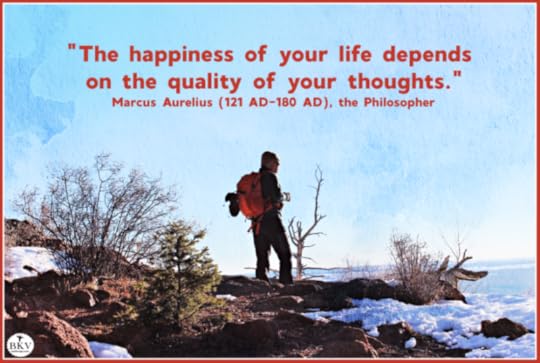
Mind your manners.
Chances are, we’ve all said those words before.
Maybe we’ve also been reminded to mind our manners.
When we mind our manners, we’re taking extra care to be polite. To remember, as I would tell my kiddos when they were younger, to use their “nice words,” like please and thank you.
But as I sat in in my room the other night fighting against a mental funk, I decided maybe we should say: “Mind your mind.”
Then I wondered how many thoughts filled my mind in a given day. Well, thanks to Google and a 2005 study by the National Science Foundation, I found an answer: The average person has 12,000 to 60,000 thoughts per day.
Surprised?
Keep reading.
The study determined that 80% of those thousands of thoughts are negative. And 95% percent are the same repetitive thoughts as the day before.
Now my mental funk made more sense. I still didn’t know why I was struggling – I couldn’t pinpoint the exact thought that took me down. But one thing I did know: I’d probably had the same thought on replay for a good while.
Does this scenario sound familiar at all, friends?
We’ve got thousands of thoughts running rampant in our minds during any 24-hour period. And thanks to the research of some unknown scientists, we now know most of those thoughts are both (a) negative and (b) reruns from the day before … and repeat, repeat, repeat, day after day after day.
Truth is, some of us didn’t need a scientific study to tell us that. We wake up, greet the day, and there they are: the same thoughts we dealt with the day before.
Sometimes it is negative self-talk we’ve been saying to ourselves for years. We look in the mirror and we see something we’ve never liked about ourselves. Again. And we let the criticism run for the rest of the day.
Or we hear that voice – the one that never stops talking – saying “You’ll never be good enough” or “I’m so disappointed in you” or “You could have tried harder” and then it recedes into the background noise in your mind – soft, unhealthy mental judgements.
Sometimes it’s just one word.
Stupid.
Ugly.
Unwanted.
Failure.
One word on an endless loop in our mind. We’re not paying attention … but we are listening. Subconsciously, we’re hearing all that negative chatter.
This is where the “mind your mind” part comes in.
Of course, there’s no way we can monitor every single thought we have. Not going to happen. But we can certainly be proactive about creating a healthier mindset.
Decide who is going to be your voice of authority. Oftentimes, we’ve handed this role to critical people who have no right to be controlling our thoughts and actions. We need to choose who gets to have a say in our lives.
Start the day off with a positive affirmation. I like “This is the day the Lord has made, we will rejoice and be glad in it.” (Psalm 118:24). I started saying this with a walking buddy – and now I say it on a daily basis. What’s something uplifting you could say to start your day?
Do a mind-assessment. If you find yourself skidding mentally, take a break and retrace your thoughts. Try to pinpoint if a particular comment or interaction triggered the negative emotions. Reset your mindset with prayer or music or meditation.
What do you do to “mind your mind”?
The Danger of Believing Everything We Think http://bit.ly/2GEjyIf #bepositive #choices
Click To Tweet
'The happiness of your life depends on the quality of your thoughts.' quote by Marcus Aurelius http://bit.ly/2GEjyIf #behappy #choices
Click To Tweet
February 12, 2019
How Real Life Redefines Bravery
by @BethVogt
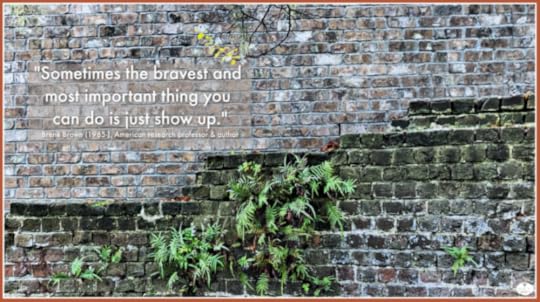
“Sometimes the bravest and most important thing you can do is just show up.” ~Brené Brown, American research professor
Can I just be honest and say life went off the rails last week?
The past seven days have been all about trying to find some sense of calmness in the midst of recovering from crisis, all the while juggling real life and writing life.
This blog post doesn’t feel like an act of bravery, but it is me showing up. And as author Brené Brown says in the quote accompanying this post, showing up is important.
We’re all familiar with emergencies — those times when circumstances erupt and destroy all sense of normalcy, leaving us off-kilter and searching for a way out … a way back to all the good we had just a few seconds before our sense of control shattered.
And yes, I could share the particulars of my crisis last week, but the what and whys and hows aren’t important. We all have had times when our lives turned upside down and inside out and left us breathless.
The question becomes: what do we do?
Oh, there’s plenty to do in the midst of the immediate need. Calls to make. People to take care of. Prayers to pray. And repeat, repeat, repeat.
But what do we do when the crisis is past? When there’s no more adrenalin surging through our bodies, powering our actions. When decisions have been made, consequences are falling into place . . . and life is an odd elixir of normal and what’s-to-come.
That’s when we discover being brave is about just showing up.
I don’t know about you, but emergencies exhaust me. I’m one of those “okay, I got through the crisis, but now that it’s over, let me crawl into bed and sleep forever” kind of people.
But that’s not reality.
There’s no pause button on life. No way to say, “Hold on, I’m dealing with a crisis here. Stop everything else for a minute while I handle this catastrophe. We’ll get back to our regularly scheduled lives in a minute.”
There’s the brave that’s demanded of you when you’re surrounded by trouble. And then there’s the brave that’s demanded of you when you have to carry on in the face of living life after a disaster.
You’re still tired. You’re still hurting. You’re still asking questions. You’re still not sure how this happened — or how it’s really going to end. But life is going on. Some things are the same, and some things … some people … are forever changed.
And we … we choose to be brave and just show up and be there. To live our lives. One day at a time.
For me, showing up looks like writing a blog post.
For you, showing up may look like getting dressed for work and giving a presentation, even if you don’t feel completely prepared. Or dealing with a fussy baby. Or staring down a deadline and a word count.
Today, let’s be brave and just show up.
How Real Life Redefines Bravery http://bit.ly/2IbJPim #perseverance #encouragement
Click To Tweet
'Sometimes the bravest and most important thing you can do is just show up.' #quote by @BreneBrown http://bit.ly/2IbJPim #bebrave
Click To Tweet
February 5, 2019
Understanding Estrangement

One thing I’ve learned?
Estrangement does not mean you don’t love someone.
And yes, I speak from personal experience.
I’ve been estranged from my parents and four siblings for more than six years. That’s more than 2,190 days. My heart has carried the weight of every single one of those days.
I’ve also experienced all sorts of different emotions during those six-going-on-seven-years. Sometimes conflicting emotions within the same hour.
There were the early days, soaked in tears and stained with anger – mine and theirs.
There were days clouded with longing – the desire to pick up the phone and call someone. A sibling. A parent. To attempt a conversation. I still have those days on occasion. But then I realize nothing’s changed and the conversation would be unwise at best – and most likely emotionally reckless.
How can anything change if there’s no communication, you ask? Consider this: Just because you’re talking with someone doesn’t mean you’re communicating.
And then there are the days when I miss my mom. My dad. My two sisters. My two brothers. Usually it’s when a birthday rolls around. Or Thanksgiving. Or Christmas.
But my friend Wise Guy – remember him? – has helped me understand an important distinction. What I’m missing are the relationships I wish I’d had with my family, not the reality of the way things are – the way things were for years and years before the estrangement.
On those days, I whisper, “Happy birthday” or “Merry Christmas.” I pray for them. And I pray for me, too.
Often, you can come to accept that just because you love someone romantically it doesn’t mean you’re meant to be together. Sometimes you can love someone but it doesn’t work out.
Here’s another truth I’ve learned: Just because you are family doesn’t mean there’s love enough to fix what’s wrong. Sometimes … sometimes love does not conquer all.
But what about forgiveness, you say. What about reconciliation?
Estrangement doesn’t mean you haven’t forgiven someone.
There’s a scripture verse that encourages us to “Do all that you can to live in peace with everyone.” (Romans 12:18 NLT)
Sometimes . . . sometimes you can’t do enough to bring the peace. And the hardest thing I’ve learned is to accept that reality. To stop trying to make everything okay. To stop thinking, “Maybe if I do this … or that … say this … or don’t say that, then I can fix everything. Maybe I can be the right person …”
And all the while truth was being hidden. I was being hurt. And when I took a stand for truth, that’s when our relationships were strained to the breaking point.
Even knowing all this, estrangement is still strange.
Where’s the hope in all this?
I know the estrangement is not my fault. And I’m not saying this emotional stalemate is my parents’ and siblings’ fault, either. We’re just . . . broken. And fixing what is broken is not my responsibility. Recognizing this allows me to step back and realize God is at work even when I don’t see it. God will let me know when and if He wants me to do something, say something . . . as He has all along. My hope and confidence is in what He will do – not in me and my imperfect efforts.
Understanding Estrangement: A Few Truths I've Learned Living with Brokenness http://bit.ly/2Dco78o #estrangement #familyrelationships
Click To Tweet
'This Life is messy.' quote by Ken Livingstone http://bit.ly/2Dco78o #family #relationships
Click To Tweet
January 29, 2019
The Power of Prayer When Life Hangs in the Balance
How God Allows Us to be Lights in the Valley of the Shadow
by @bethvogt
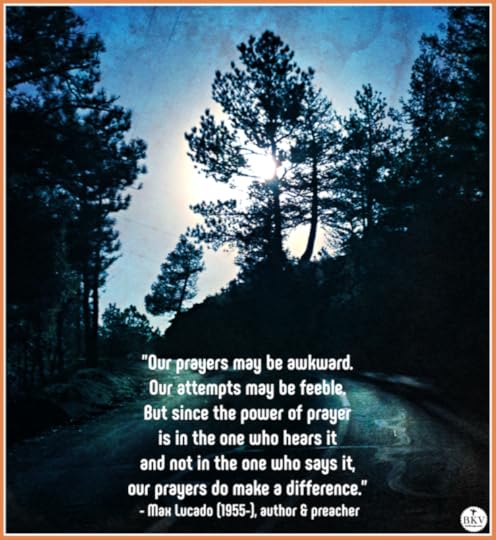
A friend’s 16-year-old son fought for his life last week.
Ten days ago, Schafer was diagnosed with Influenza A. He developed a secondary bacterial infection and within two days of his initial diagnosis he was taken by Flight for Life to Children’s Hospital in Denver where a team of medical providers battled to save his life with the best of modern medical technology.
Consider words like strep. Toxic shock syndrome. Sepsis. Respiratory failure. Kidney failure. Heart failure.
Schafer walked in the valley of the shadow of death.
And yes, God was with him.
His family – parents, brothers, aunts, uncles, grandparents, cousins – is a family of faith. And from the first, they put their hope and trust in God, even as tears soaked their prayers. Weeping indicates pain and sorrow, not a lack of faith.
As Schafer walked in the valley of the shadow, the light showed up.
Friends took over first one waiting room at Children’s Hospital. And then they needed a larger one. A FB page community for updates is 3300+ members strong. A Meal Train is set up so the family doesn’t have to think, “What will we eat?” Hey, with four teen boys, it’s a legit question. And a GoFundMe page provides increasing monetary support for the financial needs the family faces as Schafer faces weeks – more likely months – of recovery.
But the brightest light in this valley?
The prayer warriors.
Prayer is not a tangible thing, like a hug or a video message or a warm meal or even cash pulled from checking accounts and piggy banks.
Prayer can be silent or spoken aloud or scrawled in a journal. The words can be whispered when we’re alone or when we’re circling a hospital bed, unable to fathom all of the tubes and all of the monitors and all of the how-did-this-happen questions bombarding our minds even as we cover a 16-year-old with the spiritual benediction of seek, ask, trust, and release . . .
But prayer is always, always powerful.
And prayer lights the darkness.
Psalm 23 tells us that God, our shepherd, walks with us in dark valleys . . . in the darkest of valleys where death’s shadow hovers.
There is no greater comfort than that.
God allows us to be light in the times of such darkness. When we pray with belief. And hope. And confidence. And trust.
Not expecting anything of God except that He be God . . . that He be whom He has said he would be.
Available.
Faithful.
Compassionate.
Merciful.
In the early hours of not knowing how their son’s story would go, Schafer’s parents yielded and entrusted him to God. As they prayed, they balanced on the tightrope between hoping and grieving. Their faith kept them from falling.
And the prayers of others held them steady. Schafer has been constantly surrounded by prayer for the past 10 days. His time in the valley of shadow was lit by hundreds, even thousands, of prayers all around the world uttered by family members and friends and friends of friends and even strangers who heard of the need and responded.
Such is the power of prayer.
The Power of #Prayer When Life Hangs in the Balance http://bit.ly/2D2ILrB #faith
Click To Tweet
'Our prayers may be awkward. Our attempts may be feeble. But since the power of prayer is in the one who hears it and not the one who says it, our prayers do make a difference.' #quote by @MaxLucado http://bit.ly/2D2ILrB #prayer
Click To Tweet
January 22, 2019
In Others’ Words: The Importance of Protecting Our Dreams
@BethVogt

We all chase after dreams.
During our childhood, the simplest of questions may spark a dream: What do you want to be when you grow up?
Pause for a moment and let’s remember that oh-so-much-younger us. The one who didn’t hesitate to believe we could become a ballerina. Or an astronaut. Or a dolphin trainer. Or a magician. Or an author. Or someone who raised a better family than the one we were living in.
And maybe today we are living our dream … or we aren’t.
Some dreams come true. Some dreams don’t. Sometimes our dreams change because, well, we change. We grow up and dream different dreams. It’s okay to let go of one dream for another one.
Whatever our dream, one thing is always true: Chasing dreams is dangerous business.
Pursuing dreams means confronting doubts.
Oh, sure, we’ll meet other people who tell us that we can’t do what we want to do. Our dream? Impossible. We lack the talent. The skill. The wherewithal.
But it’s all the more distressing when the voice inside our head is talking smack. Convincing us that we’ll fail. Taunting us to quit before we even start. Reminding us of past mistakes. Hinting at future disasters.
To succeed, we must believe in who we are right now. We need to say, “I’m enough at this moment,” even as we stretch our hands out to opportunities and strive to be more. To do more.
Dreaming requires that we both imagine and we work. We must determine how to push past fears and the doubts – others and our own – allowing the hope of who we could become and what we could accomplish to be stronger than the pull of all the “”can’ts” and “won’ts.”
Want to hear a funny story about how tricksy doubts can be?
After my first novel was published, I was working on my second novel. I struggled to write, caught in the throes of “second-book-itis.” I was bogged down, unable to start, much less finish, the book. I sat at my desk, staring at all the insufficient words on my computer screen, and thought: Where do I get off thinking I can write a novel?
I let that doubt have its way with me for a bit … until I realized how utterly absurd it was. Where did I get off thinking I could write a novel? I had written a novel – and it was published! In every sense of the word, I was a published novelist, and yet, here I was, listening to doubt and believing a lie.
Doubts breed lies. About who we are. About what we can accomplish. And lies? Lies will never lead us to our dreams.
We need to defend our dreams with the truth of who we are: imperfect people who will fail on our way to making our dreams come true.
An odd defense, you say? Not at all. Let’s accept ourselves for who we are, weaknesses and strengths. The better to face our doubts on firm ground of reality and hold on to our dreams.
In Your Words: What helps you hold on to your dreams in the face of doubts?
In Others' Words: The Importance of Protecting Our Dreams http://bit.ly/ CNFVqj #dreams #nodoubts
Click To Tweet
'Doubt kills more dreams than failure ever will.' quote by author Suzy Kassem http://bit.ly/2CNFVqj #perspective #keepdreaming
Click To Tweet
January 15, 2019
In Others’ Words: Thoughts on How to Keep Growing
@bethvogt
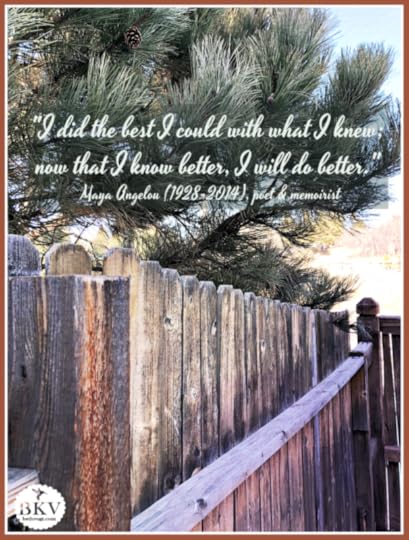
“I did the best I could.”
I’ve never been a fan of those six words.
Here’s how the conversation usually goes:
I’m sitting across from someone who is recounting a struggle they faced where there was no resolution. No improvement. And then they sum up their efforts by saying, “I did the best I could.”
I listen. Let their words be.
But inwardly, I’m cringing.
You did the best you could – and you expected some sort of different outcome? A better result?
All too often, “doing the best I could” is code for “Nothing changed, but it’s okay. It’s not my fault.” “Doing the best I could” means we think what we did – and what we’re doing – is sufficient. It’s carte blanche for saying and doing the same thing over and over again.
There’s no growth if we never get past that kind of thinking.
If we’re having problems with someone, or if we’re part of the problem in a relationship – and yes, it’s usually a bit of both, isn’t it? – then doing the best we can won’t help the situation get better. Our repeated behavior won’t produce change.
Growth happens when we realize “doing the best we can” isn’t enough. Or when we say, “I’m doing the best I can … and it isn’t helping.”
This is when we ask ourselves,” What else can I do? Is there some different way to understand this situation or another way to interact with this person, that will improve things?”
And often personal growth means asking for help.
When my first three kiddos were little, I confronted the reality that I was an angry mommy. “Reality” was the tearful face of my toddler after I’d yelled – too loudly and for no good reason.
I didn’t want to be an angry mommy. I didn’t want my children crushed under the weight of my anger. No child should have to carry the burden of an adult’s anger.
I could have said, “This is the best I can do.” It would have been the truth because of who I was at the time.
You know what? If that had been my response, I would also be saying, “I did the best I could” today to my now-adult children.
But instead, I sat on my living room floor and had a good cry. And then I stopped and said, “I want to do better than this. I want to be so much more than an angry mom. How does that happen?”
Change didn’t happen overnight. It was bathed in more tears and prayers and required that I face some ugly truth in my past.
But it was also worth all of the hard stuff because when I held my fourth child in my arms years later, I embraced both her and the a-ma-zing truth that I was no longer an angry mommy.
I didn’t want to “do the best I could,” because that wasn’t good enough. I figured out how to do better.I
Maya Angelou’s words expresses it so well: Growth in life is about doing the best we can with who we are and what we know, while always striving to know more, to become more, so we can do better.
In Your Words: How do you move past doing your best to doing better?
In Others' Words: Thoughts on How to Keep Growing -- Doing Better Than Your Best #growth #change
Click To Tweet
'I did the best I could with what I knew; now that I know better, I will do better.' #quote by @MayaAngelou #growth
Click To Tweet
January 8, 2019
In Others’ Words: Choosing Which Moments Define Us
@bethvogt
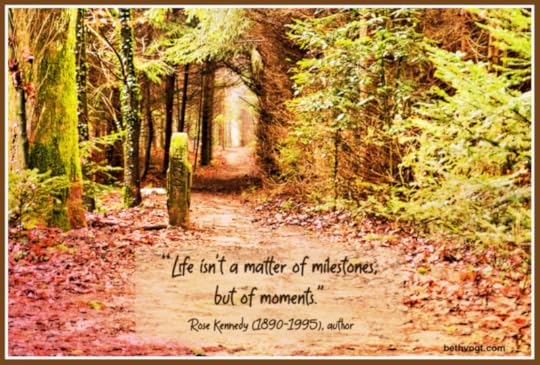
At some point in our lives, we’ve all been cautioned not to make a mountain out of a molehill.
Some well-meaning person thinks we’re overreacting to a situation – or maybe thinks we’re overreacting to them – and wants us to calm down. Maybe they’re right . Maybe we need to step back and take a deep breath. Or maybe the situation, whatever it is, warrants a little emotion.
Today, I’d like to put a little spin on the whole mountain-molehill cliché and share how my friend Wise Guy taught me not to make a “milestone out of a moment.”
I met Wise Guy at a time when I’d established quite a number of milestones in my life. They were emotional markers I’d set up through the years so I could look back over my shoulder and say, “And then this happened” over and over again.
In doing so, I could explain myself.
My behavior.
My woundedness.
My heart-limp, if you would.
There were the mini-milestones – life events that impacted me. Breaking off an engagement at 20, for example – and how just about everyone told me I was making the biggest mistake of my life. These well-meaning friends, of course, didn’t know the whole story.
Yes, that story is another blog post.
And then there was “the” milestone. The experience that loomed largest, that always seemed to ensnare me, as if to say, “Who you are starts and ends here.” Childhood abuse has a way of rooting itself deep in your soul. Of obscuring all other milestones.
Wise Guy challenged me with two questions: “Is the abuse going to be a defining moment in your life? Or just a moment?”
Up until he asked the questions, I hadn’t realized that choosing was an option.
For so long, what had happened to me had been so big, so bad, it was the all-powerful Defining Moment in my life. And I assumed it always would be so.
Wise Guy’s questions – and his counsel – helped me see how I believed the lie that someone else’s actions defined me. Over time, I also realized I could confront the biggest emotional milestone in my life and choose to change it – to downsize it – into just a moment.
Did this happen overnight? No. You don’t define yourself one way for years and years – how you act and react to people and situations – and then magically transform your thinking because someone says, “Hey, you’ve been looking at this the wrong way. Think moment, not milestone.”
But my understanding the truth that “what happened to you doesn’t define you” was the first step to toppling that monumental emotional marker in my life.
Life is both milestones and moments. But we need to carefully choose which moments we commemorate with milestone markers.
And we can choose.
That’s the truth.
In Your Words: Milestones or moments or both: what is your life made of?
In Others' Words: Choosing Which Moments Define Us http://bit.ly/2C8Avpl #choices #perspective
Click To Tweet
'Life isn't a matter of milestones, but of #moments.' #Quote by Rose Kennedy http://bit.ly/2C8Avpl
Click To Tweet
In Others’ Words:Choosing Which Moments Define Us
@bethvogt

At some point in our lives, we’ve all been cautioned not to make a mountain out of a molehill.
Some well-meaning person thinks we’re overreacting to a situation – or maybe thinks we’re overreacting to them – and wants us to calm down. Maybe they’re right . Maybe we need to step back and take a deep breath. Or maybe the situation, whatever it is, warrants a little emotion.
Today, I’d like to put a little spin on the whole mountain-molehill cliché and share how my friend Wise Guy taught me not to make a “milestone out of a moment.”
I met Wise Guy at a time when I’d established quite a number of milestones in my life. They were emotional markers I’d set up through the years so I could look back over my shoulder and say, “And then this happened” over and over again.
In doing so, I could explain myself.
My behavior.
My woundedness.
My heart-limp, if you would.
There were the mini-milestones – life events that impacted me. Breaking off an engagement at 20, for example – and how just about everyone told me I was making the biggest mistake of my life. These well-meaning friends, of course, didn’t know the whole story.
Yes, that story is another blog post.
And then there was “the” milestone. The experience that loomed largest, that always seemed to ensnare me, as if to say, “Who you are starts and ends here.” Childhood abuse has a way of rooting itself deep in your soul. Of obscuring all other milestones.
Wise Guy challenged me with two questions: Is the abuse going to be a defining moment in your life? Or just a moment?”
Up until he asked the questions, I hadn’t realized that choosing was an option.
For so long, what had happened to me had been so big, so bad, it was the all-powerful Defining Moment in my life. And I assumed it always would be so.
Wise Guy’s questions – and his counsel – helped me see how I believed the lie that someone else’s actions defined me. Over time, I also realized I could confront the biggest emotional milestone in my life and choose to change it – to downsize it – into just a moment.
Did this happen overnight? No. You don’t define yourself one way for years and years – how you act and react to people and situations – and then magically transform your thinking because someone says, “Hey, you’ve been looking at this the wrong way. Think moment, not milestone.”
But my understanding the truth that “what happened to you doesn’t define you” was the first step to toppling that monumental emotional marker in my life.
Life is both milestones and moments. But we need to carefully choose which moments we commemorate with milestone markers.
And we can choose.
That’s the truth.
In Your Words: Milestones or moments or both: what is your life made of?
In Others' Words: Choosing Which Moments Define Us http://bit.ly/2C8Avpl #choices #perspective
Click To Tweet
'Life isn't a matter of milestones, but of #moments.' #Quote by Rose Kennedy http://bit.ly/2C8Avpl
Click To Tweet



